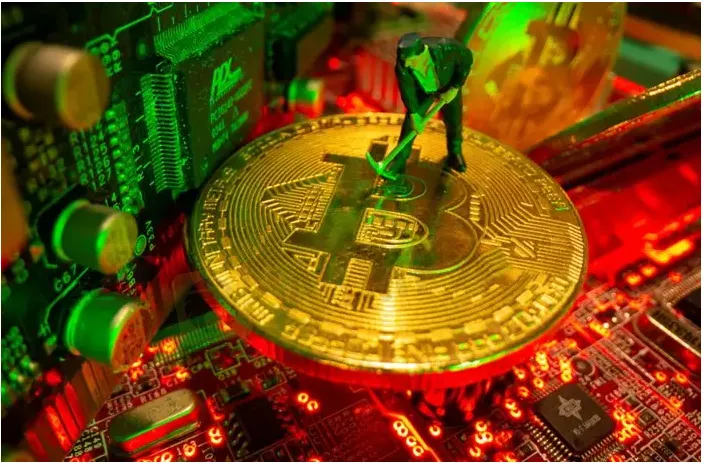简体中文
繁體中文
English
Pусский
日本語
ภาษาไทย
Tiếng Việt
Bahasa Indonesia
Español
हिन्दी
Filippiiniläinen
Français
Deutsch
Português
Türkçe
한국어
العربية
Bitcoin miners sell their holdings amid crypto winter’s chill
Abstract:Bitcoin miners have been forced to tap into their cryptocurrency stashes as a plunge in prices, rising energy costs and increased competition bite into profitability.

The number of coins miners are sending to crypto exchanges has been steadily climbing since June 7, researchers at MacroHive noted, in a sign that “miners have been increasingly liquidating their coins on exchanges.”
Several publicly listed bitcoin miners collectively sold more than 100% of their entire output in May as the value of bitcoin tumbled 45%, an analysis by Arcane Research https://tmsnrt.rs/3nhYdHA found.
“The plummeting profitability of mining forced these miners to increase their selling rate to more than 100% of their output in May. The conditions have worsened in June, meaning they are likely selling even more,” said Arcane analyst Jaran Mellerud.
Bitcoin sales by public miners https://fingfx.thomsonreuters.com/gfx/mkt/gkplgejyyvb/bitcoin%20mining.JPG
Bitcoin miners, who run networks of computers to earn tokens by validating transactions on the blockchain, are typically staunch crypto “HODLers” and collectively own around 800,000 bitcoins, according to CoinMetrics data.
The crypto mining space rapidly expanded in 2021 as bitcoin more than quadrupled in value, but this growth has further pressured margins as the process is designed to grow more difficult as the number of miners increases.
“Over the past six months, hash rate and mining difficulty have increased while the price of bitcoin has dropped. These are both negatives for existing miners as both work to compress margins,” said Joe Burnett, analyst at bitcoin mining firm Blockware Solutions.
High energy prices are also hitting miners, which by some estimates use more electricity than the Philippines, according to the Cambridge Bitcoin Electricity Consumption Index.
“If you‘re not at a very low-cost electricity area at this point, you’ve got to shut down,” noted Chris Brendler, senior research analyst at D.A. Davidson.
Bitfarms, Riot Blockchain and Core Scientific are among companies that announced sales, with Bitfarms chief executive officer saying the company is “no longer HODLing daily bitcoin production.”
Shares of publicly listed miners have been battered even more than bitcoin, with the Valkyrie Bitcoin Miners ETF falling 59% this quarter compared to 53% drop for bitcoin.
Some miners, including Bitfarms, are using proceeds to negotiate financing agreements to fund operations and make payments on expensive mining equipment.
If miners have already paid two-thirds or even 70% of the price of these millions of dollars in machines, they wouldnt want to miss the final installments, which makes them desperate for financing, Brendler said.
Given their significant bitcoin holdings https://tmsnrt.rs/3xUJesg, some analysts point to miner sales as another factor weighing on bitcoin prices.
Valuations and holdings of public bitcoin miners https://fingfx.thomsonreuters.com/gfx/mkt/lbvgnxmrqpq/Pasted%20image%201656347748285.png
Light at the end of the tunnel?
Miners using older and more energy-intensive machines, and without the balance sheet and access to financing of publicly listed players are already struggling.
Bitcoins mining difficulty decreased 2.35% this week, Glassnode data showed, indicating the network had adjusted after some miners turned off their rigs.
This takes some pressure off those that have not given up.
“Bitcoin mining is a zero-sum game. If you can continue running when others cannot that means you have a larger share of the pie,” said Charlie Schumacher, spokesperson for the largest publicly listed miner Marathon Digital Holdings Inc.
Marathon has not sold bitcoin since October 2020, he added.
“Bitcoin bottoms have been marked at the end of miner capitulation, that could be a sign that the miners that can survive this capitulation have a light at the end of the tunnel,” Burnett said.

Disclaimer:
The views in this article only represent the author's personal views, and do not constitute investment advice on this platform. This platform does not guarantee the accuracy, completeness and timeliness of the information in the article, and will not be liable for any loss caused by the use of or reliance on the information in the article.
Read more

WikiEXPO Dubai 2024 will take place soon!
2 Days Left!

Italian Regulator Warns Against 5 Websites
The Italian regulator, CONSOB has issued a warning against five websites offering unauthorized financial services. This regulatory action aims to protect the public from fraudulent activities.

WikiEXPO Dubai 2024 is coming soon
3 Days Left!

Trader Exposes Unethical Practices by STP Trading
A recent allegation against STP Trading has cast doubt on the firm's business practices, highlighting the potential risks faced by retail traders in an increasingly crowded and competitive market.
WikiFX Broker
Latest News
Hackers Charged for $11M Crypto Theft Using SIM-Swaps
Role of Central Banks in the FX Market
FCA Alerts Against Sydney FX
What Makes Cross-Border Payments Easier Than Ever?
Trader Exposes Unethical Practices by STP Trading
Bitcoin Nears $100,000: A Triumph of Optimism or a Warning Sign?
Malaysian Man Loses RM113,000 in Foreign Currency Investment Scam
Mastercard Partners with JPMorgan for B2B Cross-Border Payments
FCA Identifies Clone Firm Exploiting Admiral Markets' Credibility
Coinbase Under Scrutiny Amid Wrapped Bitcoin Delisting Controversy
Currency Calculator


